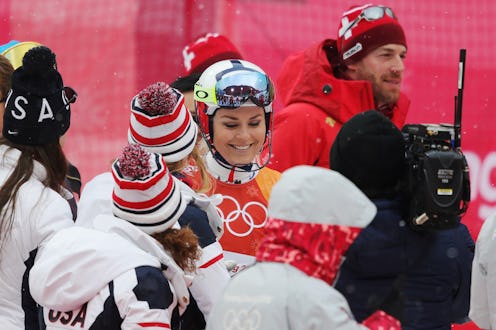Life
Here’s What Many Olympians End Up Doing For Work After The Games

With the Olympics in full swing and the Closing Ceremony's Feb. 25 date fast approaching, surely one of the biggest questions on everyone's mind is what some of these athletes are going to do after the games. Sure, it's obvious that some will go back to training for the next Winter Olympics games, but what about the athletes who are retiring, or the athletes who don't land lush sponsorship deals to rake in the big bucks and have to train for the next games whilst making their own money? What jobs do Olympians do after the Olympics to earn a living if their primary source of income isn't their sports?
Their stories are intriguing for two reasons: For one, most Olympians have spent the majority of their lives training for the Olympic games. A life of regimen and competition has been their norm for so long — it's easy to assume that the prospect of entering the real world after living life that way would be difficult. Secondly, retirement also comes a lot earlier for them — unlike traditional jobs, most Olympians aren't retiring when they become a senior citizen, so they still have a lot of life left if they choose to move to other jobs.
Retired British Olympic rower Elise Laverick Sherwell, who is now an attorney, explained the situation the The Muse well. "Your life was so regimented before. It was a four-year goal. Every month, you knew what you had to achieve and perform at. Suddenly, you don’t have that same structure." Sherwell said. "You can choose your own life, and that’s so frightening when you come straight from sports because you had this full-on lifestyle right from university that was tightly scheduled, and suddenly, you’re faced with this unknown where you plan your own path."
So, what jobs would an Olympian settle in best? Here's what other Olympians have done in the past throughout history.
I think my favorite career change for a former Olympian comes in the form of swimmer Johnny Weismuller who won five gold medals while competing in the 1924 and 1928 Olympic games. Following his successful Olympic turn, Weismuller signed on to play Tarzan in Tarzan the Ape Man. He went on to star in five sequels and has a star on the Hollywood Walk of Fame.
Of course, for some Olympic athletes, their success from the games, along with international recognition, allows them to continue living the life of an Olympian long after they've left their final games. Sponsorships, endorsement deals, or becoming a motivational speaker are a few of the ways this is possible — or a former Olympian might even become a coach in their own right.
Motivational speaking is a great way to continue your legacy after your time competing is over while making money. Take Nicola Adams, the first female to win an Olympic boxing medal. Following her history-making turn at the 2012 Olympic games, Adams got into motivational speaking, and went on to discuss her sports journey, as well as what it's like to be an openly-bi Olympic athlete.
While motivational speaking is great for Adams, though, at the 2016 Rio games alone there were 558 Olympians competing from just Team USA. There's not enough lecture halls in the world for all of them to become career Olympians.
No matter if they become a career Olympian or transition to another profession, it's important to acknowledge the mental health impact the Olympics can have on athletes. In fact, mental health issues can even stand in the way of Olympians competing — for instance, bronze-medalist figure skater Gracie Gold released a statement detailing how her mental health struggles caused her to make the hard decision not to compete in the 2018 Winter Olympics. "I am still undergoing treatment for depression, anxiety and an eating disorder,” Gold said in a statement. "It pains me to not compete in this Olympic season, but I know it’s for the best"
The National Alliance on Mental Illness breaks down the mental health aspect of the Olympics clearly. The organization explains that if one in five adults have a mental health condition then, as an estimate, about 49 of the 244 team USA athletes at the 2018 Olympics are affected. By Gold openly acknowledging her struggle, she is helping pave the way for other top athletes to do the same.
For athletes who train to become Olympians, it takes giving your heart and soul every day for a good chunk of their life, but it doesn't have to be their entire life. The Olympics can be just one part of the story, what comes next is completely up to them.